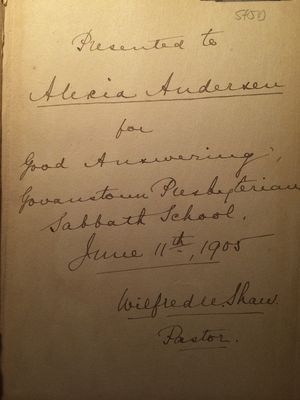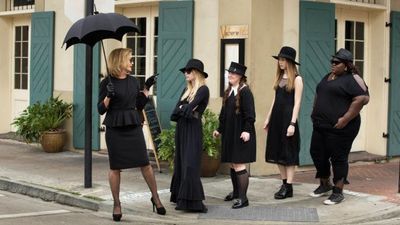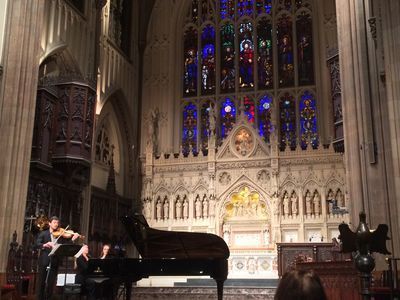Alex Ross's Blog, page 153
November 18, 2013
November 14, 2013
Inscription
Operatic witches vs. jazz killer
The reliably outrageous TV show American Horror Story deserves a prize for the Foiling of Pop-Triumphalist Stereotypes. The most recent episode opened with a scene set in New Orleans in 1919, in which a coven of witches confront the Axe-Man, a serial killer who also plays jazz saxophone. The Axe-Man has issued an ultimatum to the city, promising to visit mayhem on any home from which jazz music is absent. (How Adorno would have enjoyed this allegory.) The witches defiantly put on a record of the "Casta diva" from Norma — an apt choice, given the opera's druidic setting. When the Axe-Man enters, he finds himself outmatched. For once, the polarity classical / pop does not align with repressed / liberated or stuffy / cool or evil / good. I trust someone is already working on a paper for the next meeting of the American Musicological Society.
Bad Beethoven poetry
An Angel by direct descent, a German by alliance,
Thou didst intone the wonder-chords which made Despair
a science.
Yea, thou didst strike so grand a note that, in its large vibration,
It seemed the roaring of the sea in nature's jubilation.
O Sire of Song! Sonata-King! Sublime and loving master;
The sweetest soul that ever struck an octave in disaster;
In thee were found the fires of thought—the splendours of
endeavour,—
And thou shalt sway the minds of men for ever and for ever!
Swann 100
On the "petite phrase" in Swann's Way, and other moments in imaginary music.
November 13, 2013
More bad Wagner poetry
Farewell, Great Spirit! Thou by whom alone,
Of all the Wonder-doers sent to be
My signs and sureties Time-ward, unto me
My inmost self has ceased to be unknown!
Others have been as glasses where was shown
The fashion of my face, or where to scan
The secrets of my utmost offspring—Man—
And learn to what his worth or shame had grown.
The worship of their names has filled the sky,
Their thunder has been heard, their lightning seen,
Yet after-suns have rolled themselves on high
And still have found me with unaltered mien;
Thou only hast so dealt with me, that I
Can be no more as if thou hadst not been.
— Alfred Forman, "The World's Farewell to Richard Wagner"
To Mr. Forman fell the task of first translating the Ring into English, or, at least, some language resembling it ("Fitly thy ravens take to their feathers," etc.). His brother was the distinguished literary forger Harry Buxton Forman.
Previously: Bad Bayreuth poetry.
November 12, 2013
Goerke ascendant
In the wake of her Frau ohne Schatten triumph, the soprano of the moment is slated to sing Elektra, Ortrud, Turandot, and Brünnhilde at the Met in coming seasons.
For John Tavener
The British mystic has died at the age of sixty-nine. Bob Shingleton has a thoughtful tribute.
November 11, 2013
Britten and Babbitt
November 10, 2013
Britten 100 in New York
Photo: Nathan Schram and Angelina Gadeliya play Britten's Lachrymae at Trinity Wall Street on Nov. 7.
There's a clear divide between American and British responses to the Britten centenary, which arrives on Nov. 22. Across the water, one sees understandable concerns about a relentless focus on a composer who has held dominion over British musical life since 1945, when Peter Grimes broke upon Sadler's Wells. Over here, though, Britten is in no way overexposed, and the composer's fans are jumping at the chance to hear works that appear in these parts rather rarely. Grimes, Turn of the Screw, the big song cycles, and the Yuletide choral pieces are familiar enough, but the Spring Symphony — which the NY Phil will play during the birthday week — is an altogether different proposition. Leonard Bernstein led it in 1963; I am having trouble finding evidence of a New York performance since then. I got to hear it at Aldeburgh in 1995, in a revelatory account under Oliver Knussen, and am eager to see what Alan Gilbert and his forces make of it. Paul Appleby, notable for his appearance in Two Boys, will assume the tenor part, and, before intermission, will sing Britten's Serenade.
The Britten 100 website gives a useful overview of other Britten festivities upcoming in New York. These include a Dessoff Choirs choral program on Nov. 14; a Noye's Fludde benefit for Lighthouse International, with Dr. Samuel Wong conducting; on the birthday itself, Carnegie Hall's centerpiece presentation, a hotly anticipated St. Louis Symphony Grimes (you can hear a broadcast from St. Louis on Nov. 16); on Nov. 23, a marathon of the complete string quartets at the New York Public Library for the Performing Arts; on Dec. 7, a Central City Chorus rendition of The Company of Heaven; and, on Dec. 14, a Carnegie Discovery Day devoted to Britten, with more singing by Appleby and a lecture by Paul Kildea, Britten's most authoritative biographer to date. But the richest local response remains the remarkable series staged by Trinity Wall Street, which will go on through December. The full schedule is here; upcoming highlights are the Cantata misericordium on Monday, a children's program on the birthday, and a Dec. 5 account of the Third Quartet by the brilliant young players of Decoda. More on Britten in The New Yorker in a few weeks.
Among events happening elsewhere in America, I'd like to single out a birthday concert to be presented at San Francisco's Castro Theatre by musicians from the Ruth Asawa San Francisco School of the Arts, which attracts many students from underprivileged backgrounds. Matthew Cmiel will direct, and Chanticleer will participate. Cmiel — a composer and conductor who first came to my attention as leader of the Formerly Known As Classical series — tells me that his students have fallen in love with Britten, and have also been studying such advanced fare as the Second Quartet and Third Cello Suite. He also mentions the happy effect of Wes Anderson's film Moonrise Kingdom, which seems to have incited curiosity about Britten among musically aware kids around the country.
Alex Ross's Blog
- Alex Ross's profile
- 425 followers






